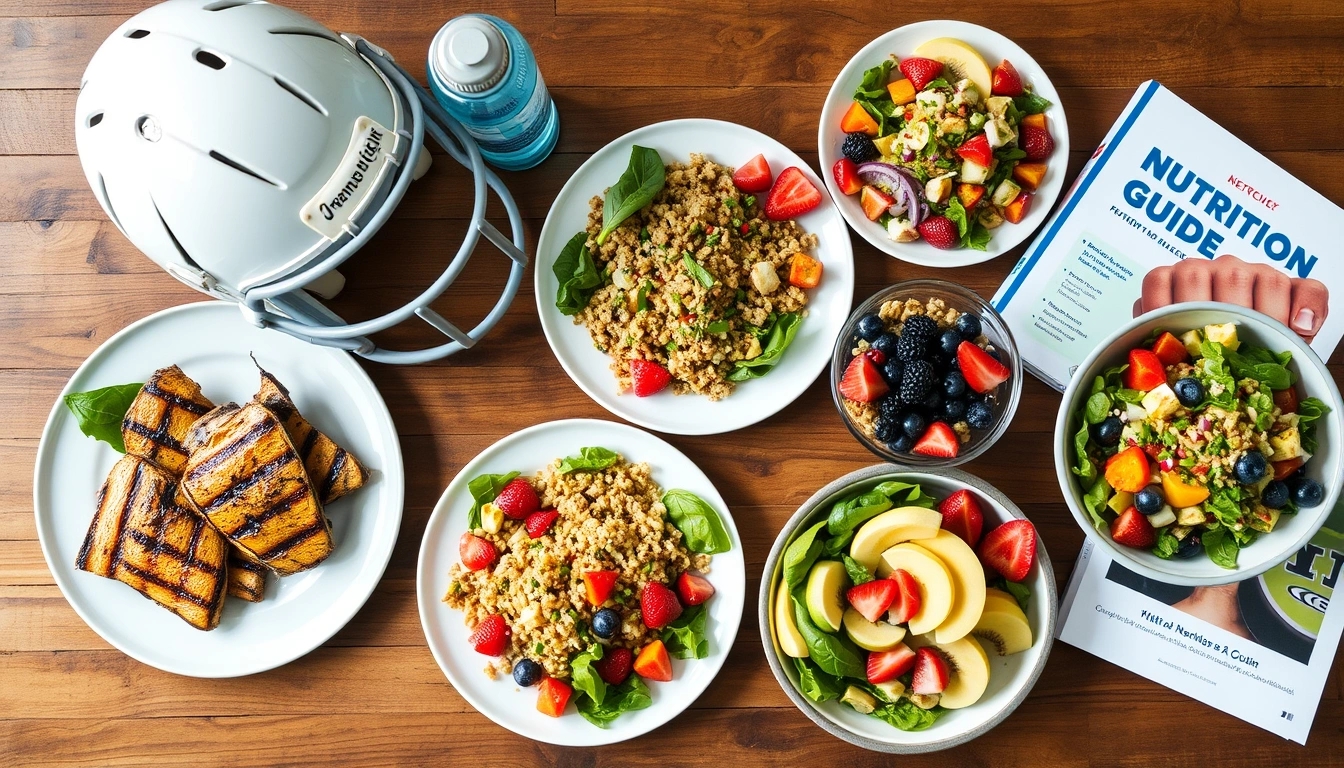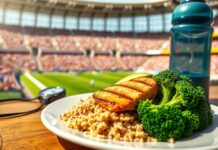Alright, so you’re a teen footballer, running around the field like a whirlwind, hoping to score that winning goal or make the tackle of the season. But here’s the kicker — you can’t just fuel up on junk food and expect to perform like a champ. Balancing nutrition and taste is the secret sauce. Yeah, I said it. You don’t have to eat bland chicken and broccoli every day to be a star athlete. Smart meal planning can boost your performance and recovery, all while keeping your taste buds happy. Sounds like a win-win, right? Let’s dive in.
Understanding the Nutritional Needs of Teen Footballers
Teen athletes are basically little engines that need fuel — and not just any fuel, but the right kind. Your body is growing, your muscles are repairing, and your energy tanks need constant refilling. Carbs, proteins, and fats each play their part. Carbs are your go-to for quick energy, proteins patch up those muscles after a brutal practice, and fats keep your hormones and brain sharp. It’s like building a well-oiled machine — if you mess up one part, the whole thing sputters.
| Nutrient | Role | Sources |
|---|---|---|
| Carbohydrates | Primary energy source | Whole grains, fruits, veggies |
| Protein | Muscle repair and growth | Lean meats, beans, dairy |
| Fats | Brain function, hormones | Nuts, seeds, avocados |
Carbohydrates: The Energy Powerhouse
You might have heard that carbs are the enemy — news flash, they’re not. For teen footballers, carbs are the main fuel that keeps you sprinting, tackling, and dodging defenders. But not all carbs are created equal. Simple sugars might give you a quick boost, then leave you crashing harder than your Wi-Fi on game day. Instead, go for complex carbs like brown rice, sweet potatoes, or whole grain bread. They release energy slowly, so you’re not running on empty halfway through the match.
- Pre-game: Grab a banana and a slice of whole grain toast.
- Post-game: Sweet potato mash with grilled chicken to replenish glycogen.
- Snack idea: Oatmeal with berries and a drizzle of honey.
Protein: Building Blocks for Muscle and Recovery
Protein is the MVP when it comes to repairing muscles after those intense sessions. But here’s the catch — more protein isn’t always better. Overdoing it or relying solely on protein shakes won’t magically bulk you up. Teens need a balanced intake from real food sources like lean meats, eggs, dairy, and plant-based options like beans or lentils. Plus, variety keeps meals interesting — nobody wants to eat chicken breast every day, right?
Fats: Not the Enemy, Just the Right Kind
Forget the old myth that fats are bad. Healthy fats are actually crucial for your brain and hormone production, which affects everything from mood to muscle growth. Think avocados, nuts, seeds, and olive oil. But yes, steer clear of the junk — chips and fried stuff might taste amazing but will slow you down faster than a bad call from the ref.
Hydration: More Than Just Water
Water is the obvious go-to, but hydration isn’t just about gulping water like it’s a race. Electrolytes like sodium, potassium, and magnesium are key players. Losing these through sweat can leave you cramping or feeling sluggish mid-game — not cool. Sports drinks can help but watch the sugar content. Sometimes, good old coconut water or a homemade electrolyte mix does the trick.
Snack Smart: Fueling Between Meals
Snacks can be your secret weapon if you pick wisely. The goal? Keep energy steady without feeling stuffed or bloated. Think nuts, fruit, yogurt, or whole grain crackers with cheese. Avoid sugary bars that promise energy but deliver a crash.
| Snack | Benefits |
|---|---|
| Trail mix (nuts + dried fruit) | Protein + carbs + healthy fats |
| Greek yogurt with honey | Protein + probiotics |
| Apple slices with peanut butter | Fiber + protein + healthy fats |
So yeah, building a football-friendly meal plan isn’t rocket science, but it does take a bit of thought. Mix it up, keep it tasty, and listen to your body. After all, you want to play hard and have fun — not just survive on bland meals and energy drinks. Now, go fuel up and hit the field like the star you’re meant to be!
Understanding the Nutritional Needs of Teen Footballers
Alright, let’s get real for a moment. Teen footballers aren’t just little adults running around chasing a ball — they’re growing, sweating buckets, and pushing their bodies like mini machines on steroids (well, not literally, but you get the idea). So, what they chow down on? It’s not just about stuffing themselves silly or grabbing whatever’s quick. It’s a delicate dance of carbs, proteins, and fats — each playing a starring role in their performance and growth.
First up, the carbs. Think of them as the fuel in the tank. Without enough carbs, a teen footballer might feel like a phone stuck at 5% battery during halftime. But here’s the kicker — not all carbs are created equal. Complex carbs like whole grains, brown rice, and sweet potatoes release energy slowly, keeping those sprints sharp and stamina high. Simple sugars? Sure, they give a quick burst, but they crash harder than your Wi-Fi during a crucial match replay.
| Macronutrient | Role | Sources |
|---|---|---|
| Carbohydrates | Main energy source for training and matches | Whole grains, fruits, veggies, legumes |
| Proteins | Muscle repair and growth | Lean meats, dairy, beans, nuts |
| Fats | Supports brain function & hormone production | Avocados, nuts, olive oil, fatty fish |
Now, onto protein. This is the muscle’s best friend and the MVP during recovery. After a grueling practice or a nail-biting game, teen muscles scream for repair. Protein helps patch up those micro-tears and build strength. But here’s a little warning — piling on protein supplements like they’re candy? Not the smartest move. Teens need balanced portions, ideally from real food sources. Overdoing it can stress the kidneys or just turn into extra calories that don’t do much good.
And fats — before you roll your eyes and think “no thanks,” fats are not the enemy here. Healthy fats are like the unsung heroes, keeping the brain sharp and hormones balanced. They’re essential, especially during puberty when everything is already a bit chaotic. The trick is to skip the junk and focus on the good stuff — think avocados, nuts, olive oil, and those omega-3 rich fish. These fats can actually boost performance and help with inflammation.
- Tip #1: Balance is key. Too much of one macronutrient can throw off energy levels and recovery.
- Tip #2: Timing matters. Eating carbs before games and protein after can make a noticeable difference.
- Tip #3: Hydration pairs with nutrition. Without proper fluids, even the best meal plan falls flat.
So, what’s the takeaway? Teen footballers need a smart, balanced diet that fuels their unique demands — intense training, growth spurts, and mental focus. It’s not rocket science, but it does require a bit of attention and effort. And hey, knowing the “what” and “why” behind their food choices is already half the battle won. The other half? Well, that’s just putting it into practice without losing the joy of eating.
Remember: Nutrition isn’t just about eating clean or hitting macros. It’s about keeping the teen athlete energized, strong, and ready to tackle whatever the game throws at them — literally and figuratively.
Carbohydrates: The Energy Powerhouse
Alright, let’s talk carbs — the MVP of any teen footballer’s diet. Seriously, if you think you can just muscle through a game or a grueling practice on protein shakes and random snacks, think again. Carbs are the real deal when it comes to fueling those explosive sprints, quick cuts, and endless running that football demands. Without enough of the right carbs, you’re basically running on empty, and nobody wants to be that guy gasping for air on the sidelines.
Now, before you freak out and start avoiding carbs because of all the diet hype out there, remember this: not all carbs are created equal. There’s a big difference between munching on a candy bar and digging into a bowl of whole-grain pasta or brown rice. The former might give you a quick sugar rush, but it’s followed by a crash that leaves you dragging your feet. The latter? Slow-burning energy that keeps you going strong from kickoff to the final whistle.
- Simple carbs (think sugary drinks, sweets) provide quick bursts of energy but tend to disappear fast.
- Complex carbs (whole grains, veggies, legumes) release energy gradually — exactly what a teen footballer needs for sustained stamina.
Here’s the kicker: teens are still growing, so their carb needs are a bit higher than adults’. That means they need to load up on foods that not only provide energy but also pack in fiber, vitamins, and minerals to support overall development. Think oatmeal with fruit for breakfast, a turkey sandwich on whole wheat for lunch, and quinoa with roasted veggies for dinner.
| Carb Type | Examples | Why It Matters |
|---|---|---|
| Simple | Fruit juices, candy, white bread | Quick energy spike, but short-lived and can cause energy crashes |
| Complex | Brown rice, whole wheat pasta, sweet potatoes | Steady energy release, supports endurance and recovery |
But hey, it’s not just about what you eat — timing is key too. Eating a carb-rich meal about 3-4 hours before a game or practice ensures your muscles have glycogen stores ready to burn. That’s why you often see coaches pushing the classic pasta dinners the night before a big match. And if you’re running low on energy during halftime, a quick banana or a granola bar can work wonders without weighing you down.
Tips for Carb Loading Before Game Day:- Avoid heavy, greasy foods that slow digestion- Stick to familiar, easy-to-digest carbs- Hydrate well alongside your meals
To wrap it up, carbs are absolutely the cornerstone of any football-friendly meal plan for teens. Skip them or choose poorly, and you’re basically setting yourself up for a sluggish performance. Nail your carb choices, and you’ll feel the difference on the field — more bursts of speed, better focus, and less “I wanna quit” moments. So next time you’re planning your meals, remember: carbs aren’t the enemy, they’re your secret weapon.
In short: Load smart, choose complex carbs, and time your meals right — your legs (and coach) will thank you.

Protein: Building Blocks for Muscle and Recovery
When it comes to teen footballers, protein isn’t just some fancy buzzword tossed around by coaches or nutritionists; it’s the real MVP behind muscle repair and growth. After those grueling practices or intense games, your muscles are basically crying out for some TLC, and protein is what steps in to patch up those tiny tears and get you ready for the next round. But hey, before you go chugging protein shakes like there’s no tomorrow, let’s pump the brakes a bit. Teens especially need to find that sweet spot where they get enough protein to recover without going overboard or relying solely on supplements. Because trust me, piling on powders isn’t the magic fix some folks make it out to be.
- Why Protein Matters: Protein is made up of amino acids — the building blocks your body uses to rebuild muscle fibers that get damaged during intense football drills. Without enough protein, recovery slows down, and performance might take a nosedive.
- How Much is Enough? For teen athletes, the general recommendation hovers around 1.2 to 1.7 grams of protein per kilogram of body weight daily. So, if you weigh 60 kg (about 132 lbs), you’re looking at roughly 72 to 102 grams of protein a day. But remember, this isn’t carved in stone; individual needs vary based on training intensity and growth phases.
Now, here’s the catch — many teens think protein means chicken breasts and protein shakes only. Nope! Protein is everywhere, and variety is key. Relying strictly on supplements can lead to missing out on other vital nutrients found in whole foods. Plus, overdoing protein can stress your kidneys or just make you feel sluggish. Balance is king.
| Protein Source | Protein Content (per 100g) | Additional Benefits |
|---|---|---|
| Chicken Breast | 31g | Low fat, high in B vitamins |
| Greek Yogurt | 10g | Probiotics for gut health |
| Eggs | 13g | Rich in essential amino acids |
| Lentils | 9g | Fiber and iron boost |
| Almonds | 21g | Healthy fats and vitamin E |
One practical tip? Spread your protein intake throughout the day. Instead of smashing all your protein in one meal, try to include a bit in every meal and snack. This steady supply helps your muscles stay fueled and ready to rebuild. Oh, and don’t forget the power of carbs and fats alongside protein — they’re the supporting cast that makes the whole recovery story work.
Protein Intake Tips for Teen Footballers:- Aim for 20-30 grams per meal.- Include a protein-rich snack post-practice.- Mix animal and plant proteins for variety.- Avoid excessive reliance on powders or bars.- Hydrate well to assist muscle recovery.
So yeah, protein is a big deal, but it’s not the whole story. It’s just one piece of the puzzle in building strength, bouncing back from workouts, and keeping your body in top shape. Forget the hype about “more is always better.” Instead, focus on smart, balanced eating that keeps you energized, healthy, and ready to crush that next game.
In the end, your muscles want quality, not just quantity. And that’s a lesson every teen footballer should take to heart.
Fats: Not the Enemy, Just the Right Kind
Alright, let’s get one thing straight — fats have gotten a pretty bad rap over the years. Everyone’s been quick to point fingers, blaming fats for everything from sluggishness to unwanted weight gain. But here’s the kicker: not all fats are created equal. For teenage football players, fats are actually a crucial piece of the nutrition puzzle, especially when it comes to brain function and hormone production. So, before you toss that avocado or handful of nuts aside, hear me out.
First off, your brain is basically a fat-loving machine. Roughly 60% of your brain is fat, so it makes sense that healthy fats help keep it firing on all cylinders. This means better focus during those nail-biting moments on the field and quicker decision-making. Omega-3 fatty acids, found in fish like salmon and flaxseeds, are like brain fuel. They help reduce inflammation and support memory — which, trust me, is a game-changer when your coach starts throwing complex plays at you.
| Healthy Fat Sources | Benefits |
|---|---|
| Avocados | Rich in monounsaturated fats, support heart health and energy |
| Nuts & Seeds (Almonds, Walnuts, Chia) | Provide omega-3s and antioxidants |
| Fatty Fish (Salmon, Mackerel) | High in EPA and DHA, reduce inflammation |
| Olive Oil | Good for hormone balance and anti-inflammatory effects |
Now, hormone production — that’s another biggie for teen athletes. Hormones like testosterone and growth hormone are essential for muscle growth, recovery, and overall performance. Guess what? Healthy fats are the building blocks for these hormones. Without enough good fats, your body struggles to produce them efficiently, which could slow down your gains or make you feel wiped out.
But here’s where most teens slip up — the junk fats. We’re talking about trans fats and excessive saturated fats found in fried foods, chips, and most fast food. These guys don’t just fail to help; they actively harm your performance and recovery. They clog up your system, increase inflammation, and can even mess with your mood. So, if you want to be on top of your game, it’s time to kick those junk fats to the curb.
- Tip 1: Swap out chips for a handful of mixed nuts or some hummus with veggies.
- Tip 2: Use olive oil instead of butter when cooking.
- Tip 3: Incorporate fatty fish into your meals at least twice a week.
Look, I get it — fats can be confusing. You’ve got people telling you to avoid them, others saying “fat is life.” The truth? It’s all about quality and quantity. Too little fat, and your body’s systems start to falter; too much junk fat, and you’re inviting trouble. So, focus on those nutrient-dense sources that actually help your body recover faster, think sharper, and build muscle better.
In short, don’t fear fats — respect them. Your brain, hormones, and overall football performance will thank you. Ditch the junk, embrace the good stuff, and watch how your energy and game-day focus improve. That’s the kind of fuel champions run on.
Hydration: More Than Just Water
Let’s get real — staying hydrated isn’t just about gulping down water like you’re in a desert marathon. For teen footballers, hydration is a whole science, a balancing act that if ignored, can leave you feeling like a soggy noodle on the field. You know that sluggish, cramp-prone feeling mid-game? Yeah, that’s your body waving a big red flag saying, “Hey, where’s my electrolytes?”
First off, water alone doesn’t cut it. Sure, it’s the MVP of fluids, but when you’re sweating buckets during a heated practice or game, you’re losing more than just water. Electrolytes — sodium, potassium, calcium, magnesium — are the real unsung heroes here. They keep your muscles firing, nerves zinging, and your heart pumping without skipping a beat. Without them, you’re basically a car running on empty, just sputtering along.
- Why Electrolytes Matter: They regulate fluid balance, muscle contractions, and nerve function. Without enough, cramps, fatigue, and dizziness sneak in like uninvited guests.
- Signs of Dehydration: Dry mouth, headache, dark urine, and that nasty mid-game brain fog that makes you forget where the goal is.
- Common Mistakes: Chugging water only after you’re already parched, ignoring salty snacks, or relying on sugary sports drinks that do more harm than good.
Now, let’s bust a myth — sports drinks aren’t magic potions. They can help replace electrolytes but often come loaded with sugar that’s just gonna weigh you down. Instead, think natural: coconut water, bananas, oranges, and even a pinch of salt in your water bottle can do wonders.
| Electrolyte | Role in Body | Food Sources |
|---|---|---|
| Sodium | Maintains fluid balance, muscle contractions | Table salt, pickles, olives |
| Potassium | Regulates heartbeat, muscle function | Bananas, potatoes, spinach |
| Calcium | Muscle contractions, bone health | Dairy products, leafy greens |
| Magnesium | Energy production, muscle relaxation | Nuts, seeds, whole grains |
Here’s a quick tip for those hectic days — start hydrating early. Don’t wait until you’re parched to start sipping. Carry a water bottle with you everywhere, and aim for small, frequent drinks rather than downing a liter in one go. Your gut will thank you, and so will your legs.
- Pre-Game: Drink 16-20 oz of water about two hours before playing.
- During Game: Sip 7-10 oz every 10-20 minutes if possible.
- Post-Game: Replenish fluids with water and electrolyte-rich snacks.
And hey, if cramps hit hard, don’t just tough it out. Stretch, hydrate, and refuel with some salty snacks or a banana. Ignoring it only makes it worse.
Remember, hydration isn’t a one-size-fits-all deal. Factors like weather, sweat rate, and intensity matter. So, listen to your body, experiment a bit, and find your sweet spot. Because in football, feeling sharp and energized beats feeling like a limp rag every single time.
Bottom line: Hydration is a combo of water, electrolytes, and timing. Nail that, and you’ll dodge the dreaded mid-game slump like a pro.

Snack Smart: Fueling Between Meals
When it comes to fueling teen footballers, snacks are often the unsung heroes. But let’s be real — not all snacks are created equal. You can’t just grab a bag of chips or a candy bar and expect to power through practice without feeling like a soggy noodle halfway through. Snacks, if chosen wisely, can be absolute game-changers, providing that quick hit of energy and nutrients without the dreaded crash or bloated belly. It’s all about picking nutrient-dense options that keep you moving.
Think of snacks as mini fuel stops on the road to peak performance. You want something that’s quick to digest but still packs a punch in terms of carbs, protein, and healthy fats. For example, a banana with a spoonful of peanut butter is a classic combo — carbs for energy, protein and fat to keep you full and steady. Or how about a small handful of mixed nuts and dried fruit? It’s like nature’s little power pack, minus the artificial junk.
- Why not just eat more at meals? Sometimes you can’t, because of time, appetite, or just plain busy teenage life. That’s where snacks come in — they fill the gaps between meals and keep energy levels stable.
- Beware of sugar traps. Sure, candy and soda give you a quick buzz, but it’s followed by a crash that leaves you dragging on the pitch.
- Hydration counts too. A snack paired with a good hydration strategy works wonders — think fruit with high water content like watermelon or oranges.
| Snack | Why It Works | Prep Time |
|---|---|---|
| Greek yogurt with honey and berries | Protein + antioxidants + natural sweetness | 2 minutes |
| Whole grain toast with avocado | Complex carbs + healthy fats for sustained energy | 3 minutes |
| Apple slices with almond butter | Fiber + protein + fat combo to avoid crashes | 2 minutes |
| Trail mix (nuts, seeds, dried fruit) | Portable, nutrient-dense, easy to snack on | 0 minutes (store-bought) |
Now, don’t get me wrong — snacks aren’t a magic bullet. You can’t just snack all day and skip meals, hoping to get by. That’s like trying to win a game with just warm-ups and no real playtime. The key is balance and timing. Eating a snack about 1-2 hours before practice or a game can top off your energy tanks without making you feel stuffed or sluggish.
Also, keep in mind that every teen is different. What works for one might not work for another. Some might feel better with more carbs, others with a bit more protein or fat. Experimentation is part of the game. And hey, if you find yourself feeling bloated or tired after a snack, take note and tweak it next time.
Tips for Snack Success:- Keep snacks portable and easy to eat on the go.- Avoid overly processed foods with hidden sugars and additives.- Pair carbs with protein or fat to keep blood sugar steady.- Listen to your body — if you’re hungry, eat; if not, don’t force it.
In the end, smart snacking is about fueling your body, not just filling your stomach. When done right, it’s the secret weapon that keeps teen footballers sharp, energized, and ready to crush those drills and games without the mid-day slump or tummy troubles. So next time you’re reaching for a snack, think of it as a strategic move — because, honestly, it is.
Sample Meal Plan: A Week of Football-Friendly Eating
Alright, let’s get real about meal plans for teen footballers — because let’s face it, nobody wants to eat boring chicken and broccoli every single day. The goal here is to create a practical, easy-to-follow weekly meal plan that doesn’t just tick the nutrition boxes but also tastes good and fits into the crazy schedules of busy teens grinding on the field.
First off, the meal plan needs to balance taste, nutrition, and prep time. No teen is gonna stick to a plan if it takes forever to make or tastes like cardboard. So, we’re talking meals that are quick, flavorful, and packed with the right fuel to keep energy levels high and muscles happy.
- Breakfast: Kickstart the day with complex carbs and protein. Think oatmeal topped with berries and a spoonful of peanut butter, or scrambled eggs with whole-grain toast. Quick, filling, and no excuses for skipping.
- Lunch: Something easy to pack and eat on the go — a grilled chicken wrap loaded with veggies, or a quinoa salad with chickpeas and feta cheese. Balanced carbs, protein, and fats to keep the afternoon training sharp.
- Dinner: This is when you want to focus on recovery. Lean proteins like salmon or turkey, paired with sweet potatoes and steamed greens. Bonus points if you can sneak in some avocado or olive oil for those healthy fats.
| Day | Breakfast | Lunch | Dinner |
|---|---|---|---|
| Monday | Greek yogurt with granola & honey | Turkey sandwich with spinach & mustard | Grilled salmon, quinoa, steamed broccoli |
| Tuesday | Smoothie bowl with banana & spinach | Chicken Caesar wrap | Beef stir-fry with brown rice & peppers |
| Wednesday | Whole grain pancakes with fruit | Hummus & veggie pita | Spaghetti with turkey meatballs & marinara |
| Thursday | Egg & cheese breakfast burrito | Tuna salad with mixed greens | Roast chicken, sweet potato, green beans |
| Friday | Avocado toast with boiled eggs | Quinoa bowl with black beans & corn | Grilled shrimp, couscous, asparagus |
| Saturday | Bagel with cream cheese & smoked salmon | Chicken & veggie stir-fry | Homemade pizza with loads of veggies |
| Sunday | French toast with fresh fruit | Leftover pizza or sandwich | Slow cooker chili with beans & lean beef |
Now, let’s chat snacks because, honestly, those between-meal munchies can make or break a teen’s energy on game day. The trick is to avoid sugary junk that leads to a crash later. Instead, go for nutrient-dense snacks like nuts, fruit, yogurt, or whole-grain crackers with cheese. These keep blood sugar steady and muscles fueled without the bloat or sluggishness.
Snack Ideas:- Apple slices with almond butter- Trail mix with dried fruit & nuts- Greek yogurt with a drizzle of honey- Carrot sticks and hummus- Rice cakes with peanut butter & banana
One last thing — prep smart. Instead of cooking everything fresh every day (ain’t nobody got time for that), batch cook staples like grilled chicken, rice, or roasted veggies on Sunday. Store them in containers for quick assembly during the week. This way, teens can grab and go without the stress.
In a nutshell, this meal plan is designed not to feel like a chore but a helpful guide that keeps teen footballers energized, recovered, and ready to crush it on the field — all while still enjoying what they eat. Because if it ain’t tasty, it ain’t sustainable.
Common Mistakes to Avoid in Teen Football Nutrition
Alright, let’s cut to the chase—teen football nutrition is a minefield of myths, half-truths, and downright bad advice. From skipping meals like it’s some kind of badge of honor to guzzling protein shakes like they’re magic potions, young athletes often stumble before they even lace up their cleats. So, here’s a no-nonsense rundown on the pitfalls that can seriously throw a wrench in performance and growth.
1. Skipping Meals: The Silent Saboteur
You’d think skipping breakfast or lunch might save time or calories, but nope, it just leaves your body running on empty. Teen footballers especially need consistent fuel because their bodies are growing and their training demands energy. Missing meals can tank blood sugar levels, leading to sluggishness on the field and poor recovery afterward. Plus, it’s a fast track to binge eating later—hello, junk food cravings!
2. Overloading on Protein Shakes
Protein is important, sure, but pounding down shakes like a contest isn’t the answer. Teens sometimes get caught up thinking more protein equals bigger muscles overnight. Reality check: the body can only use so much protein at a time. Excess often just ends up as extra calories or stress on kidneys. Whole foods like chicken, beans, and eggs should be the main protein source—not just powders and shakes.
| Common Mistake | Why It’s Bad | Better Approach |
|---|---|---|
| Skipping meals | Leads to low energy, poor recovery, and overeating later | Eat balanced meals regularly throughout the day |
| Too many protein shakes | Excess calories and strain on kidneys; misses out on other nutrients | Focus on whole food proteins and use shakes sparingly |
| Ignoring carbs | Low energy, poor endurance | Include quality carbs like whole grains and fruits |
| Neglecting hydration | Cramping, fatigue, decreased focus | Drink water and electrolyte-rich fluids consistently |
3. Carb-Phobia: The Energy Drain
Some teens freak out about carbs, thinking they’ll get fat or slow. But carbs are the main fuel for football—without them, sprinting, tackling, and quick thinking all take a nosedive. Whole grains, fruits, and veggies are your friends here. Skimping on carbs can leave you gasping for breath halfway through the game, and nobody wants that.
4. Forgetting About Fats
Fats get a bad rap, but healthy fats are crucial for hormone balance and brain function. If you’re cutting them out completely, you’re doing your body a disservice. Avocados, nuts, and olive oil are the good guys. Junk fats? Yeah, steer clear.
- Hydration slip-ups: Not drinking enough water or ignoring electrolytes can cause cramps and sluggishness.
- Relying on junk food for “energy”: Fast food and sugary snacks might give a quick buzz but leave you crashing hard.
- Ignoring recovery nutrition: Post-game meals aren’t optional—they’re essential for muscle repair.
Look, nutrition isn’t rocket science but it’s not a guessing game either. Avoid these common mistakes and you’ll be miles ahead in the game—literally. Remember, fueling your body right is as important as nailing that perfect pass or crushing that tackle.
Pro Tip:- Plan meals ahead to avoid last-minute junk food grabs.- Mix up your protein sources to keep meals interesting.- Hydrate before, during, and after practice.- Don’t be afraid of carbs or fats—they’re your energy allies.
So next time someone tells you to skip that sandwich or slam down another protein shake, think twice. Your body—and your coach—will thank you.

Tips for Making Meal Prep Fun and Sustainable
Let’s be honest: getting teens to hop on the meal prep train can feel like trying to convince a cat to take a bath. It’s a struggle, a battle of wills, and sometimes it just feels easier to order pizza again. But here’s the kicker — with a sprinkle of creativity and a dash of patience, meal prep can actually become something they look forward to rather than dread. Yes, really! It’s all about making it fun, simple, and rewarding.
- Start with the basics, but don’t be boring. Instead of throwing them into a full-blown cooking marathon, begin with easy recipes that don’t require a culinary degree — think smoothies, wraps, or sheet-pan dinners. These are quick, tasty, and give a sense of accomplishment without the stress.
- Get them involved in the planning. Nothing kills motivation faster than being told what to eat. Sit down together, browse recipes, and let them pick a few favorites. When teens feel ownership over their meals, they’re way more likely to stick with it.
Here’s a little table to illustrate how you can break down meal prep into manageable chunks that won’t overwhelm your teen:
| Prep Step | Time Needed | Why It Works |
|---|---|---|
| Chop veggies for the week | 15 minutes | Having ready-to-go ingredients means less cooking hassle later |
| Cook protein in bulk (chicken, beans, tofu) | 30 minutes | Protein’s ready for salads, wraps, or quick stir-fries |
| Portion snacks (nuts, fruit, yogurt) | 10 minutes | Easy grab-and-go options prevent unhealthy snacking |
Another golden nugget: turn meal prep into a social event. Invite friends or siblings to join in. Crank up some tunes, share some laughs, and suddenly chopping and stirring doesn’t feel like a chore. Plus, it’s a sneaky way to bond and maybe even learn a few new tricks from each other.
- Use colorful containers and fun labels. Presentation matters, folks! When meals look appealing, teens are less likely to push them aside. Plus, labeling helps keep track of what’s what, so no mystery meals in the fridge.
- Mix up the routine. Variety is the spice of life, right? Rotate different cuisines or themes each week—Mexican Monday, Stir-fry Friday, whatever floats their boat. It keeps things fresh and exciting.
And hey, let’s not forget the power of quick hacks that save time and sanity:
- Use frozen veggies: just toss them in, no chopping required.- Invest in a slow cooker or instant pot: set it and forget it.- Double recipes and freeze half for lazy days.
At the end of the day, the goal isn’t to create a gourmet chef overnight but to build habits that stick without turning mealtime into a battleground. So, cut yourself some slack, keep it lighthearted, and celebrate the small wins. Because when teens feel like meal prep is their idea — not a punishment — you’re already winning half the battle.
Frequently Asked Questions
- What are the most important nutrients for teen football players?
Great question! Teen footballers need a well-rounded mix of carbohydrates for energy, proteins for muscle repair, and healthy fats for brain and hormone function. Think of carbs as your fuel, protein as the builder, and fats as the maintenance crew keeping everything running smoothly.
- How can I make sure I’m eating enough carbs without feeling sluggish?
Choosing the right carbs is key! Opt for complex carbs like whole grains, fruits, and veggies that release energy slowly, keeping you energized through those intense drills and games. Avoid sugary snacks that cause quick energy crashes—it’s like trading a steady flame for a flickering candle.
- Is protein powder necessary for muscle growth in teen athletes?
Not necessarily! While protein shakes can be convenient, whole foods like chicken, beans, eggs, and dairy provide excellent protein sources. Remember, balance is crucial—too much protein won’t speed up gains and can even strain your body.
- Why are fats important, and which ones should I eat?
Fats often get a bad rap, but healthy fats are superheroes for your brain and hormones. Focus on sources like avocados, nuts, seeds, and olive oil. Think of them as the good kind of grease that keeps your engine running smoothly.
- How do I stay properly hydrated during practices and games?
Water is essential, but don’t forget about electrolytes like sodium and potassium—they help prevent cramps and fatigue. Sports drinks can help during long sessions, but water paired with balanced meals usually does the trick for most teens.
- What are some smart snack options between meals?
Snacks should be quick, tasty, and nutrient-packed. Try combinations like peanut butter on whole-grain toast, yogurt with fruit, or a handful of trail mix. These keep your energy steady without weighing you down.
- Can skipping meals affect my football performance?
Absolutely! Skipping meals can lead to low energy, poor concentration, and slower recovery. Think of your body as a high-performance car—it needs regular refueling to keep zooming on the field.
- How can I make meal prep less boring and more fun?
Get creative! Try colorful veggies, experiment with different spices, or involve friends and family in cooking. Turning meal prep into a fun challenge can make healthy eating feel less like a chore and more like a winning strategy.













